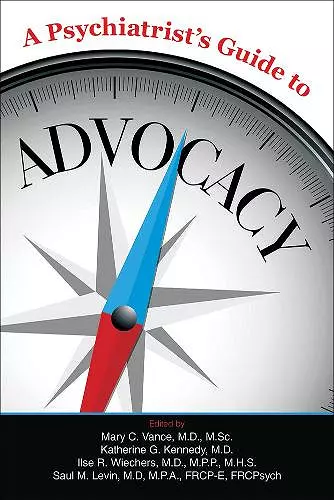A Psychiatrist's Guide to Advocacy
Saul Levin editor Katherine G Kennedy editor Mary C Vance editor Ilse R Wiechers editor
Format:Paperback
Publisher:American Psychiatric Association Publishing
Published:30th May '20
Currently unavailable, and unfortunately no date known when it will be back

Overcoming fear, ambivalence, and inertia to act on behalf of self or others can be difficult even for mental health clinicians who are accustomed to helping patients overcome challenges. A Psychiatrist's Guide to Advocacy explores the diverse definitions of advocacy and helps to identify methods and opportunities for advocacy by mental health practitioners. The editors argue for a greater culture of advocacy among psychiatrists in order to effect broad and lasting systemic and structural change. A noteworthy example is the push for insurance coverage parity between mental health and other medical care. However, legislative advocacy is just one of the many types explored in the book; advocacy takes many forms, including patient-level advocacy, organizational advocacy, education and research as advocacy, and media-targeted advocacy. Also addressed are specific issues of advocacy for special populations, including children and families, older adults, LGBTQ patients, and veterans. Taken together, these chapters represent a practical toolkit for mental health advocacy in its myriad forms.
In prose both compelling and accessible, the volume
• Identifies five of the most pressing systemic problems in mental health care (lack of access to quality payer-covered, evidence-based mental health care; the psychiatry workforce shortage; lack of parity for mental health care compared with other forms of health care; the stigma against both consumers and providers of treatment for mental disorders, including substance use disorders; and high rates of physician burnout) and explains how advocacy at different levels can address these issues.
• Describes the essential factors needed for effective advocacy, with emphasis on pathways to mentorship, providing examples of what integrating advocacy into the psychiatrist's career path looks like and identifying strategies to encourage lifelong advocacy
• Delineates the advocacy needs of diverse patient populations, including children, families, and older adults; LGBTQ, non-native, and substance-using patients; veterans and military service members; and more
• Includes four substantive interviews with advocacy role models who embody and embrace the advocate's mission, expressed in actions and on platforms that are diverse and illustrative
• Includes learning objectives that tell readers what they can expect to master by the end of each chapter, allowing for focused reading and easy review
A Psychiatrist's Guide to Advocacy is a call for action and a blueprint for change, providing clinicians with the foundation for recognizing their opportunities and embracing their roles as advocates.
This is a useful tool for psychiatrists looking to get involved in improving their patients' lives beyond the office appointment. Each chapter presents clear objectives and offers examples of how to successfully practice advocacy as per interviews with prominent psychiatrists. Although the book does not include a section on systemic racism, it acknowledges its importance along with other social determinants of health. There are not many guides that assemble this number of tools and resources in one place for psychiatrists to access when looking for ways to further help their patients, and for that I strongly recommend it.
-- Zachary Cohen Hommer, M.D. * Doody's Book RevieISBN: 9781615372331
Dimensions: 229mm x 152mm x 20mm
Weight: 757g
458 pages